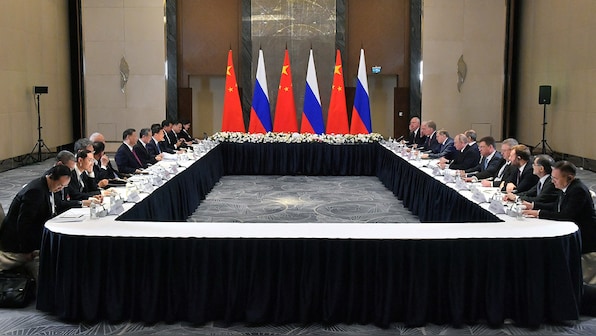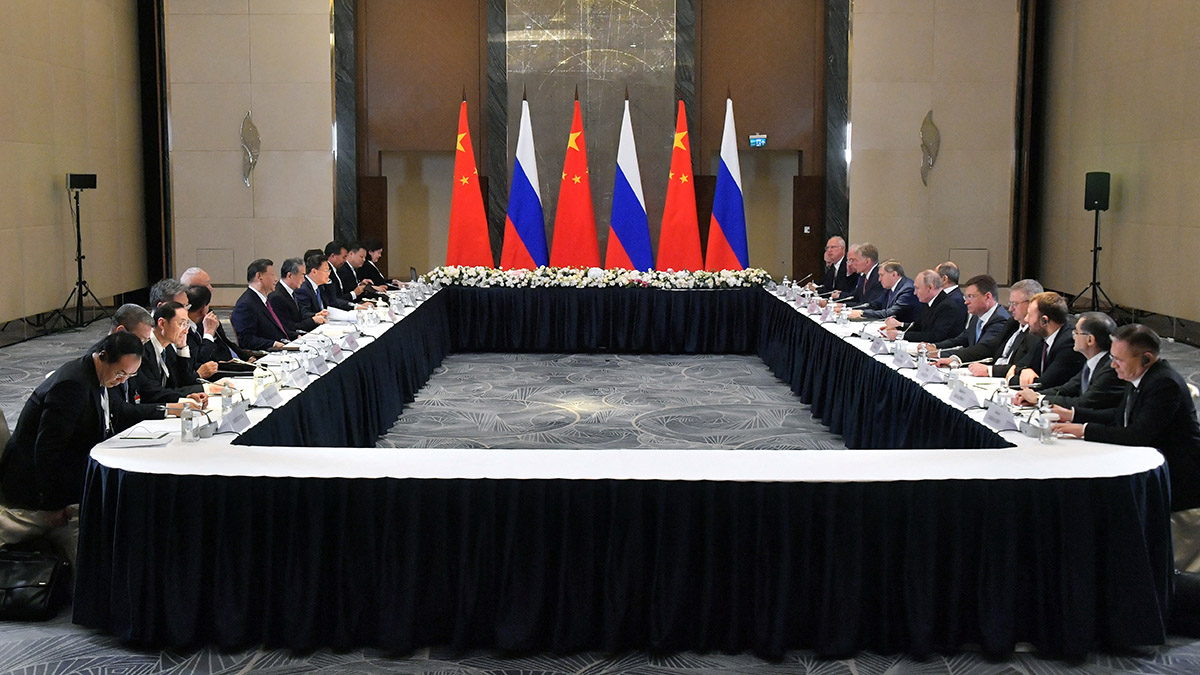How SCO can overcome its internal divisions and fulfil its role in maintaining regional stability
- August 12, 2024
- Posted by: Anil Trigunayat
- Categories: China, Russia

As the SCO expands its agenda and welcomes new members, deep-seated contradictions threaten its efficacy. Can an organisation that purports to fight terrorism effectively do so with members who engage in it?
)
)
Members of the delegations, led by Russian President Vladimir Putin and Chinese President Xi Jinping, hold talks on the sidelines of the Shanghai Cooperation Organisation (SCO) summit in Astana, Kazakhstan July 3, 2024. Reuters
Kazakhstan is currently hosting the 24th Shanghai Cooperation Organisation (SCO) Summit in Astana from July 3-4. The last summit was held under the chairmanship of India, albeit virtually, exactly a year ago.
Interestingly, for the SCO, the US Independence Day also coincidentally falls during the summit. It ironically looks at an alternative security architecture dominated by China and Russia, especially as several of its members are subjected to geopolitical and geo-economic contestations. This non-Western, even anti-Western, character is further emphasised by the presence of Moscow and newly inducted member Tehran, both heavily sanctioned by the West. The quest for new definitions and markers for an emerging multipolar world order remains an underlying theme.
Advertisement
India is represented by Dr S Jaishankar, Minister of External Affairs, although Kazakhstan’s President Tokayev had invited Prime Minister Modi to attend virtually. Some commentators speculate that Modi’s decision to forgo the summit stems from China’s dominance within the grouping, the presence of Pakistan, and ongoing tensions between New Delhi and both nations. The official reason cites scheduling conflicts and the ongoing Parliament session. But then PM Modi is also heading to Russia and Austria the following week.
It’s worth recalling that ironically, India and Pakistan both joined the SCO together in 2017 after more than fifteen years of protracted negotiations. This also happened at the Astana Summit. While Russia wanted India to be part of the Shanghai Five (later known as the SCO), the Chinese predicated that on the entry of Islamabad.
You May Like
Safety and ReliabilityMitsubishi Electric
This year’s summit unfolds amidst heightened global disruptions, aiming to address a range of critical issues, from rising security tensions and mounting protectionism to intensifying competition in high-tech space. The Eurasian space itself has its own geo strategic competition not only from Turkey, the US, and others, but also between China and Russia, particularly in Central Asian landscape. India, with its “Connect Central Asia” policy, must navigate this complex landscape carefully, avoiding any concessions to geopolitical competitors within the SCO. This is particularly crucial as China’s presence and narratives, and Belt and Road Initiative (BRI) are increasingly becoming non-transparent and less reliable.
Advertisement
Incidentally, as the “birthplace” of the BRI, Kazakhstan was among the first Central Asian countries to join the infrastructure project after it was launched in 2013. This highlights how dependencies can arise in the absence of viable alternatives.
One of the key objectives of the SCO was to fight against extremism and terrorism. However, due to geopolitics, it ended up including countries that are determined to use cross-border terrorism as an instrument of their foreign policy. Ironically, these countries are also supported by a permanent member of the UNSC and founder of the SCO, which puts technical holds on the designation of terrorists at the 1267 committee, thereby giving state and non-state actors a big breather and moral and material boost.
Advertisement
The SCO does have a robust Regional Anti-Terrorist Structure (RATS) to cooperate and collaborate and possibly counter terrorism, with regular exercises among member states. But of what use is that when one witnesses the double-speak and false standards by the very actors acting mischievously? Furthermore, respect for sovereignty and territorial integrity, principles enshrined in the SCO charter, are threatened by the hegemonic ambitions of certain powerful members.
Under India’s presidency last year, the theme was aptly advanced and crafted by PM Modi as “Secure SCO.” SECURE stood for Security, Economy and Trade, Connectivity, Unity, Respect for sovereignty and territorial integrity, and Environment. India’s focus will likely remain on these core principles, guided by mutual respect, shared interests, and sensitivity to each other’s concerns.
Advertisement
The SCO is experiencing growth both in its membership and in the scope of its activities. Iran joined in 2023, Belarus is set to join this year, and several Middle Eastern nations are seeking observer or dialogue partner status. Furthermore, the organisation is also expanding in the areas of its deliberations and programs, from infrastructure, investment, and informatics to trade, technology, physical and digital connectivity, and intra-regional migration—let alone deliberations on regional and global security issues, which have diluted its ambit and actionability to a certain extent. The importance and intensity of South-South cooperation and the fight against increasing protectionism in the West are becoming more salient.
Advertisement
The SCO Foreign Ministers’ Council, meeting on May 20-21, engaged in substantive discussions on deepening cooperation within the organisation. Key areas of focus included environmental protection, humanitarian and cultural exchange, transport interconnectivity, and various aspects of security – food, economic, and energy. The ministers reaffirmed their commitment to regional security, particularly combating what SCO Secretary General Zhang Ming has termed the “three evil forces”: terrorism, extremism, and separatism. This commitment extends to tackling drug trafficking, cybercrime, and other transnational threats. Modernisation efforts are also underway to make the SCO more topical and resilient to emerging challenges.
The next meeting of the SCO Council of Heads of Governments is scheduled to be held in Pakistan for the first time in autumn this year as they take on the SCO Presidency. How the dynamic between India, China, and Pakistan eventually plays out may impact the trajectory of cooperation within the SCO in the times to come.
While the Astana Declaration of 2024 is expected to address the emerging regional and global landscape, including challenges and SCO initiatives promoting peace and harmony, its true impact hinges on member states’ adherence to their own established norms and standards. Only through genuine transparency, trust, and truth can the SCO effectively fulfil its role in maintaining regional stability.
The author is the former Indian Ambassador to Jordan, Libya and Malta and is currently a Distinguished Fellow with Vivekananda International Foundation.
